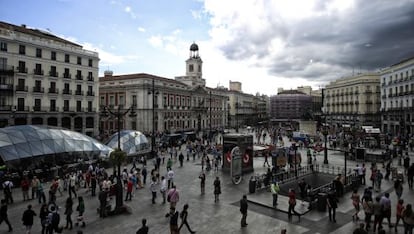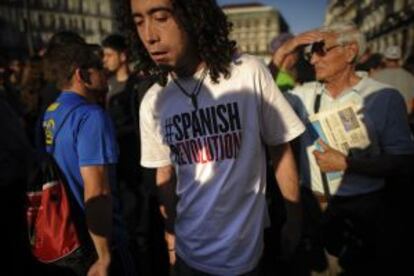Two years on from the “indignant” occupation of Sol, what now for 15-M?
The Madrid-born popular protest movement is facing a number of challenges


Over the course of its two-year existence, the 15-M grassroots protest movement has changed. The movement, which took its name from the May 15, 2011 occupation of Puerta del Sol square in central Madrid, has moved on from the "indignation" that was originally proposed by French thinker Stéphane Hessel, with the aim of encouraging direct action against individuals and entities. Below is a list of the key changes the movement has experienced.
It's angrier. "Two years ago we had 4.5 million unemployed, and now we have six million," says veteran member Eduardo Maura, who has analyzed the movement since it set up camp in Puerta del Sol in the spring of 2011. He says that while the number of supporters has fallen, activists these days are making their dissent felt by organizing so-called escraches — noisy protests outside the homes and offices of government officials — as well as through lock-ins, squats, and trying to form a human chain around Congress. There has also been a move toward direct action against banks such as Bankia via hacking or setting up pickets outside branches. The slogan for this year is: "From indignation to rebellion: escrache the system."
It's in danger of fragmenting. Two weeks after they decamped from the Puerta del Sol, 15-M supporters moved into neighborhoods throughout the city, and began organizing direct action among residents through popular assemblies. Instead of protesting about homelessness in general, activists tried to prevent people who were unable to pay their mortgages from being evicted from their homes. "I can see a clear transformation of the movement," says Juan, a member of one of the capital's most active assemblies, in the Carabanchel district to the southwest of the city. Like all of the activists EL PAÍS spoke to, he would only give his first name. "At the start, the movement was huge, with well-attended demonstrations, but it has transformed into a network of autonomous collectives that use the assemblies to address specific issues. Each collective works on whatever issue interests it: evictions, health, education, social services..." The result, in the opinion of Manolo, a member of a group interested in economics, is that 15-M no longer leads the protests. "It is just another group." Or, as another activist puts it: "We have not grown, we have specialized in certain areas, looking for new ways to be active."
One foot in politics. Over recent months there have been several proposals to enter politics as a way of helping the movement grow. Achieving a genuinely participative democracy and opening up the electoral process is the chief political goal of hundreds of activists. Two examples: Confluencia, which aims to attract voters away from the Socialist Party and the United Left; and Partido X, created by a group of 20 activists who wish to remain anonymous. "Our program is the most modern in the world: democracy, that's it," says an anonymous member. "The aim is to make politics more participative. If another party achieves this first, we'll support them, and if not, we'll run for office and win. We need greater control over our institutions." In Andalusia, where the Socialist Party administration is drafting a law with just that aim in mind, groups linked to the 15-M movement have set up Democracia Digital Andalucía, which is already contributing to the proposed law.
Escraches and legal action. The movement has added to its repertoire of protest methods. The outbreak of escraches has angered many politicians, as well as most of the Spanish media — including EL PAÍS. Activists argue that the failure of politicians to prevent hundreds of thousands of people from losing their homes makes them justifiable targets. The 15-M movement has also brought legal action against former IMF boss Rodrigo Rato for his handling of Bankia, a savings bank that went belly up last year.
Mutual support. "You come to my escrache, and tomorrow I will vote to support public health, and the next day we'll join a lock-in at the university." Some activists are... well, very active. They are constantly on the lookout for new ways to register their indignation. The downside is that the movement is losing members, who are unable or unwilling to dedicate their lives to protesting.

Anger is spreading. The 15-M movement has made its presence felt in just about every kind of protest organization over the last two years. During the demonstrations called by Madrid healthcare professionals earlier this year, 15-M was present. "Doctors have proved to be good students," says Marta Franco, who writes for 15-M. "It's clear that the movement has influenced a lot of recent protests."
- Its membership is changing. Many of the founders of 15-M, who are tired of activism or who have gone abroad in search of work, have given way to new members. Two of the movement's founding members, leaders of the Democracy Now! group, and among its most visible in the early days, Jon Aguirre and Fabio Gándara, have moved on. Gándara has just co-published El cambio comienza en ti (or, The change starts in you), which he describes as "an overview of the last two years, of what is happening in Spain, and offering new ideas to open up the electoral process, and move on from indignation to doing something constructive."
It's slowing down. Activism is tiring, and 15-M is a hard taskmaster. "Most of those who started this are still involved, although we no longer give as much time as before. It is interesting to see new blood coming in, because those of us who have been involved since the beginning have become a little contaminated," says a lawyer associated with the movement. Patricia Horrillo, a journalist with close ties to 15-M, says it desperately needs new members: "Those who are constantly on the front line get tired; we need others to get involved and become politicized."
Manolo, the economist, says it is only logical that activists are lost along the way: "The 15-M movement has developed its political proposals over time, and this reduces the space within which it can be influential. As its members have increasingly put forward more radical proposals, those who were there at the beginning have naturally begun to feel more distanced from what is going on."
Tu suscripción se está usando en otro dispositivo
¿Quieres añadir otro usuario a tu suscripción?
Si continúas leyendo en este dispositivo, no se podrá leer en el otro.
FlechaTu suscripción se está usando en otro dispositivo y solo puedes acceder a EL PAÍS desde un dispositivo a la vez.
Si quieres compartir tu cuenta, cambia tu suscripción a la modalidad Premium, así podrás añadir otro usuario. Cada uno accederá con su propia cuenta de email, lo que os permitirá personalizar vuestra experiencia en EL PAÍS.
¿Tienes una suscripción de empresa? Accede aquí para contratar más cuentas.
En el caso de no saber quién está usando tu cuenta, te recomendamos cambiar tu contraseña aquí.
Si decides continuar compartiendo tu cuenta, este mensaje se mostrará en tu dispositivo y en el de la otra persona que está usando tu cuenta de forma indefinida, afectando a tu experiencia de lectura. Puedes consultar aquí los términos y condiciones de la suscripción digital.








































